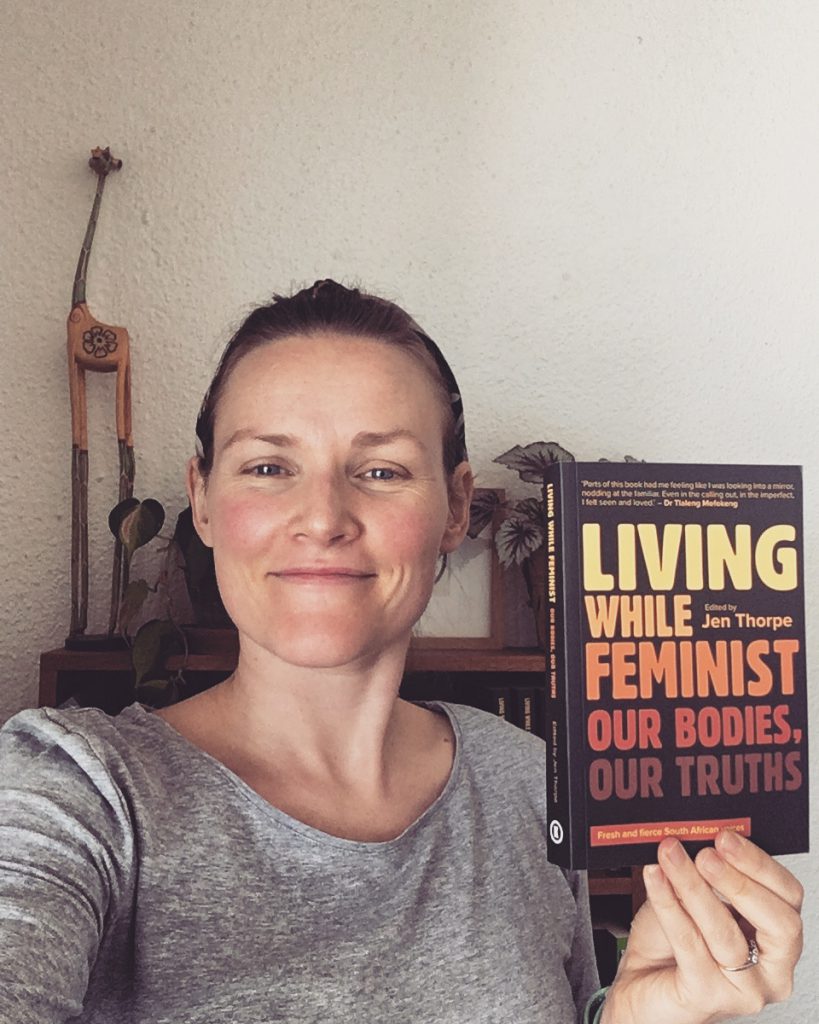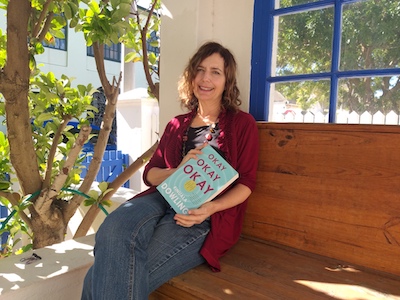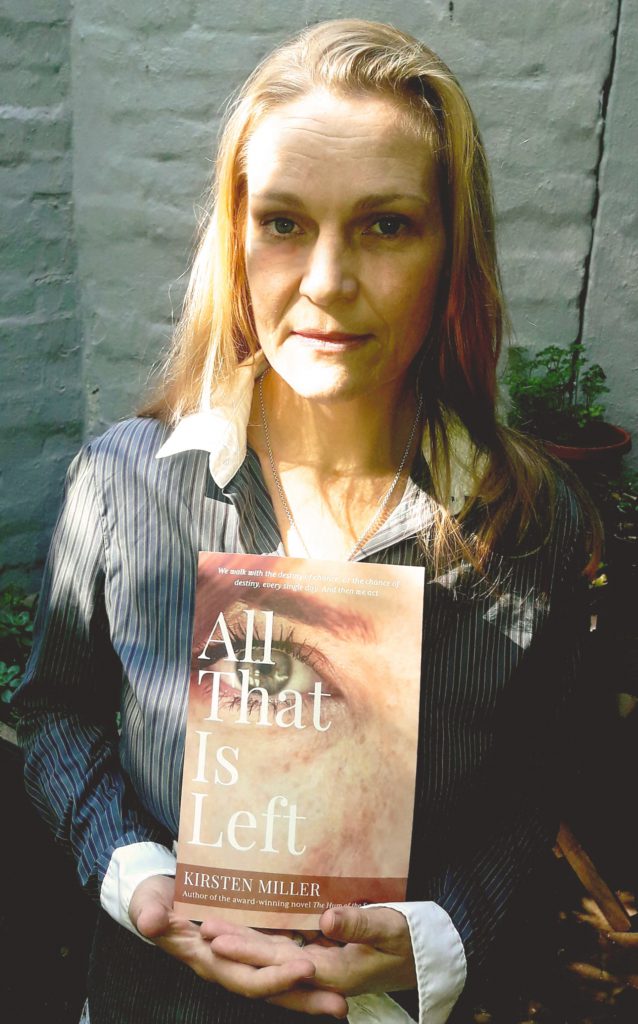I hope you are all enjoying these Q & A’s as much as I am! Authors are one of my favourite kinds of people and I always find it so fascinating getting to know the person behind the pages.
Introducing our next { homegrown } writer, Jen Thorpe, author of The Peculiars – (I read this in 2 days straight back in 2016 and thoroughly enjoyed it), Living While Feminist, and her latest, Feminism Is, which is a collection of 31 essays by South African Women Feminists. I have yet to read this book but it is on my TBR (I know one of the contributors – shout out to Aimee-Claire – can’t wait to read your essay.)
With thanks to NB Publishers for the collaboration, especially during this time where most of us are spending more time at home. So, without further ado, I welcome Jen, and her interview. Go forth and read it, then check out her books.

– Do you have a specific routine that you follow when you sit down to write, or are you able to sit and write at any time?
If I sit down, I write. It’s the sitting down that’s the difficult part.
When I’m writing fiction, I do like to make sure that my desk is tidy, that I have a blank piece of paper nearby to write down ideas or things I should look up later or try to work out, and a big piece of cardboard where I can write the character names down as I go.
I normally write non-fiction or opinion pieces when something has provoked an emotional response in me. I generally sit down and try to get all my thoughts on paper, and then I clean it up afterwards.
– What book/s are you currently reading?
Fiction: I’ve just finished Naomi Alderman – the Lessons. I’m about to start Anna Burns – Milkman.
Non-fiction: I’ve just finished David Sedaris – Theft by Finding. It was AMAZING. I’m currently reading How Fiction Works by James Wood; In Other Worlds: SF and the Human Imagination by Margaret Atwood; and Rage Becomes Her by Soraya Chemaly.
– Which SA authors have inspired you in your own writing?
So many! Lauren Beukes, Sarah Lotz, Pumla Gqola, Hedley Twidle, Dominique Botha, Kerry Hammerton, Koleka Putuma, Tlaleng Mofokeng, Maire Fischer and Rahla Xenopoulos in their workshops … I could go on all day.
I should also say that I find the book festivals in SA very inspiring in terms of coming up with ideas and hearing from other authors. Open Book festival is my absolute favourite.
– Did you always have a passion to write a book or did it / they stealthily creep up on you?
I think a more appropriate description is that I go through periods of giving myself permission to write, and periods of pretending that other things are more important. When I give myself permission then the writing comes, but when I send my attention elsewhere, it doesn’t.
– Which has been your favourite book to write so far?
I really enjoyed writing my forthcoming book, The Fall. I enjoyed plotting the characters and the creativity that comes when you decide that the rules of the real world need not apply in your story.
– What were your favourite books as a child?
To be honest I just loved reading and would read pretty much anything I could get my hands on. I loved the Famous Five and Secret Seven books, loved Roald Dahl and anything where the grown-ups were getting into trouble. I really enjoyed choose your own adventure books too. I enjoyed horror and scary books but also stories that followed the same characters for several books – so you might find me reading Goosebumps or Stephen King one week and Sweet Valley High the next.
– To date, what is the worst book you have ever read, and why?
In our book club we try to read quite widely, and we went a bit too wide once with an old book called – Iphegenia: The Diary of a Young Lady Who Wrote Because She Was Bored. By the end of it I was bored too, and I hated the main character.
– Do you think SA women writers and authors are treated differently to their male counterparts in the publishing world?
Next year I’ll be studying again and focusing on that topic exactly! So I’ll let you know more once I find out.
My experience in the publishing world has had its good and bad times, but I must say that the all-female publishing team that I get to work with at Kwela are phenomenal and I trust them with my work wholeheartedly.
I think categories like ‘women’s fiction’ are problematic, in that they suggest that there is something a bit odd or different about the way that women write stories, so I’m glad that South African publishers don’t really emphasise that category.
– If there was one piece of advice you could give to aspiring SA authors, what would it be?
Write, write honestly, write bravely, and write as much as you can.
BONUS QUARANTINE QUESTIONS:
– If we weren’t in lockdown and you could have any authors around your table for dinner, who would they be and why?
David Sedaris (for the humour), Scarlett Thomas (to pick her brain about writing), Malcom Gladwell (because he is interested in everything and I’m sure the conversation would go wild places), Zadie Smith (because I’m a huge fan!), Pettina Gappah (because her writing is just fantastic)… wait, how big is my dinner table?
– What is one item you have either made/ tried/ learn’t while being in lockdown, and was it successful?
I’ve gotten really into drawing during the lockdown and I’m enjoying it. I’ve always been quite into yoga, so I’m glad to have reconnected to that practice.
– While the lockdown was fairly sudden, and our new normal sprang up quickly, what has been a silver lining to you during this time?
I have a few:
- It gave me some ideas for a new book, and I’ve started writing it.
- Our Living While Feminist author party via Zoom.
- Zoom calls with friends and family to keep you feeling a bit normal.
- Yoga! Yoga! Yoga!
- Spending time with my husband.
- More open conversations online about the way we work and the new, kinder and better ways we could be doing it.
- Fiction podcasts.
– We have all had time to realise that we miss certain things or places during this time, what is yours?
I miss the forest and walking on the mountain, the smell of fynbos and earth, the sound of the different birds and how the gravel crunches under my feet.
I miss hugging my family and friends.
I miss bookshops and art shops.
– What is one pet hate in your current situation with who you live with? Be it a partner, child or animal?
Honestly, I don’t have one.
Thanks so much Jen for chatting to us, it was great to see a snippet of you. We readers are so blessed with such an abundance of talent in our own country.
Here’s to week 5, our final in Level 5 Quarantine (we hope). May you all stay safe and well.

